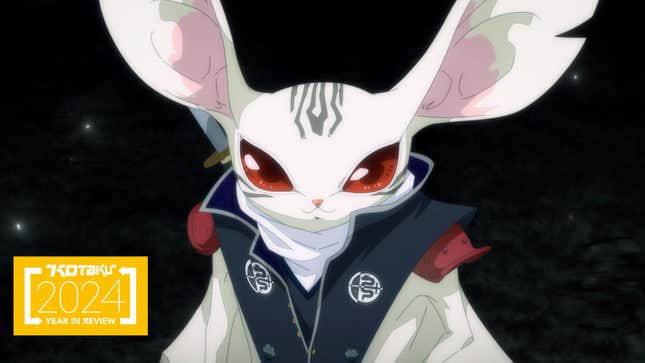
Image: Atlus / Kotaku
Every year we play a ton of great games that we celebrate in December, and those games can be great for all sorts of reasons: amazing level design, incredible atmosphere, outstanding combat or exploration, you name it. But more often than not, it’s the heroes and villains of a great game that stick with us the longest, persisting in cosplay, fan art, and sometimes the thirst posts we subject our followers to on social media. Now that our Game of the Year list is out there, we wanted to take the time to recognize some of the characters from those games (and other games we loved) that we’re still thinking about long after rolling the credits on their respective adventures. Spoilers for some of these games will follow, so feel free to skip any game you’re worried about.
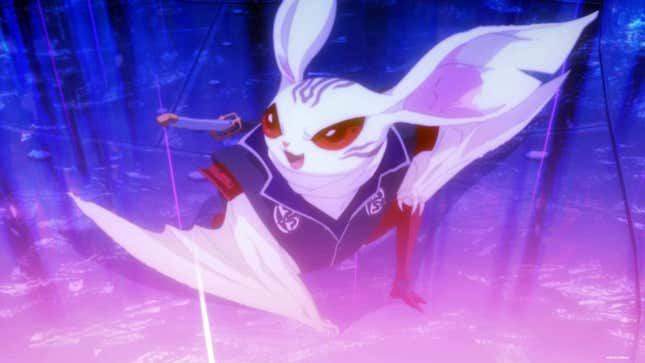
Screenshot: Atlus / Kotaku
Metaphor’s thief starts out lower than the rest of the crew. Heismay isn’t the bright-eyed optimist that you’d expect to find fighting for a better, more progressive world. He starts off as a recluse, accused of a crime he didn’t commit, all while trying to grieve his lost son. When the one thing that was your whole world is gone, what point is there in hoping for a better day? Heismay is a punching bag wherever he goes. He’s subject to prejudice for being a eugief and his own people have their own reasons for subjecting him to cruel and unusual punishment. If there was ever a person who had a reason to cast all hope and compassion aside, it’s Heismay. But just because one loses their way without a light doesn’t mean they have to stumble through the dark. Heismay doesn’t have his son to care for any longer, but he still finds ways to honor him, telling stories of the child he lost so he never forgets the guiding light he once had.
Moving forward when you feel like you have nothing to live for can seem impossible, even if you have people who support you through your darkest moments. Heismay was nearly too far gone, feeling too weak to carry on. He was ready to die in the sandworm-infested desert and leave the uncaring world behind him. But finding something to live for in a world that feels rigged against you and makes you face constant heartache and loss is true strength. Heismay is half the size of his teammates but with twice the heart. He is the struggle of Metaphor: ReFantazio personified, finding hope in a world that has given him no reason to so much as look for it. — Kenneth Shepard
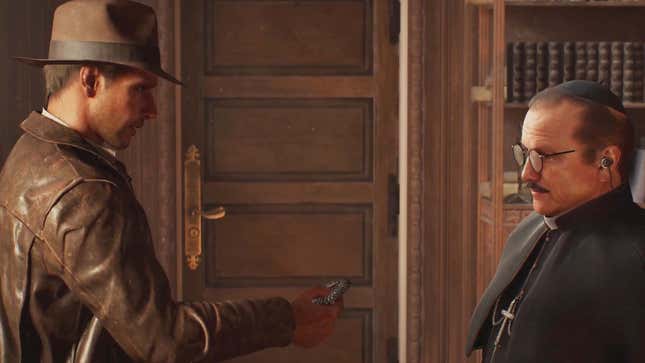
Screenshot: Bethesda / Kotaku
Indiana Jones has always had a terrific assortment of friends around the world. Characters like Sallah (John Rhys-Davies) not only make his cinematic adventures more vibrant and entertaining, but they clue us into the fact that Dr. Jones’ work has already earned him the friendship and admiration of many good people all over the globe, so he must be doing something right. Antonio, a Vatican priest, assists Indy in his latest adventure, and he’s an immediate standout, one you can tell the writers of The Great Circle put some real thought and care into developing. Not some stuffy or stereotypical figure, Antonio’s a three-dimensional person and a delight. A moral figure but not a moralizing one, he’s a man who looks with fear on the turning of political tides around the globe but still wants to be able to savor the good things in life, like that humdinger of an American record that Indy brings him as a gift.
Played terrifically by Enrico Colantoni, an actor with an impressive resumé who I’m most familiar with from his work in Galaxy Quest as Mathesar, the leader of the Thermians, Antonio is thoughtful and believable, a crucial part of The Great Circle’s wonderful globehopping, pseudo-historical texture. And so, while the game saw me laying my eyes on the pyramids of Gizeh, on ancient statues of the Buddha, and on other wonderful sights and cultural wonders, it may be that the sight I’ll remember most is that of Antonio, this keenly intelligent, kind, wonderful priest who wears hearing aids, dancing with delight to the groovy sounds of the latest hit out of New York City. — Carolyn Petit
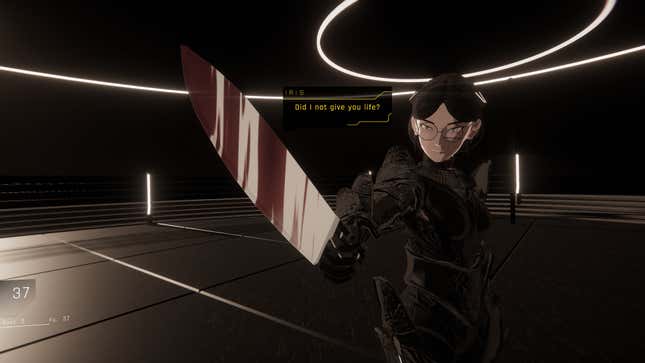
Image: Sunset Visitor
Iris is an enigma through most of 1000xRESIST, but she’s also the most important character in its melodramatic science-fiction tale. At one point in time, she was just a teenage girl with teenage problems. She had a friend who annoyed her, a mother who thrust her expectations upon her, and like teenagers often are, she was never willing to open up to most people. When an alien invasion and an accompanying disease wiped out the rest of humanity, she was left alone with no one but clones of herself to carry on society. Iris became a god-like figure to her “daughters” and even as she ascended to a throne of her own making, the same anger, resentment, and insecurity she felt as a child grew with her. When the only people around you are copies of yourself, there’s no one there to check you as you rise beyond what any human should ever be. The farther you lift yourself above those you consider beneath you, the harder you’ll hit the ground when you fall. — Kenneth Shepard
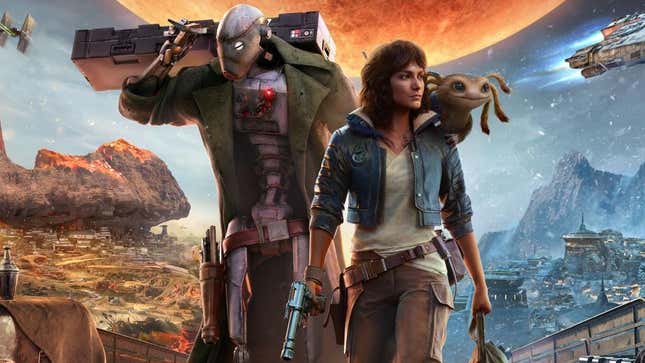
Image: Ubisoft
Okay look, I’m no Star Wars lore expert—for that, we’d need Zack, but he’s not here today, so you’re stuck with me instead. As a casual fan of Star Wars and someone who really enjoyed Outlaws, I found ND-5 to be one of the most distinctive and memorable droids I’ve had the pleasure of encountering. Droids in Star Wars, in my opinion, often kind of fall into this uncomfortable space. On one hand, the franchise sees them as unfairly discriminated against, but on the other, it’s long been wary of reckoning with whether or not droids actually are sentient—should we care if a droid is forced to do slave labor or has its memory wiped, or are they actually just robots that may put on a show of having real thoughts and feelings but remain just disposable machines?
Increasingly in recent years, however, it’s seemed to me that Star Wars no longer wants to treat the sentience of droids with any ambiguity, and ND-5 is one of the best examples yet of a droid whose inner life is clearly as rich and complex as that of any other living being. You can see the ways in which he’s torn between old loyalties and his desire to be a faithful friend to Kay Vess. In other words, he’s a terrific supporting character for a story set in the criminal underworld of Star Wars, one who illuminates all the shades of doubt and conflict that come with existing in that world, and the uneasy way that he and Kay work their way toward a kind of understanding and partnership helps make those elements feel personal. Here’s hoping we haven’t seen the last of these two. I really want to see where their adventures take them next. —Carolyn Petit
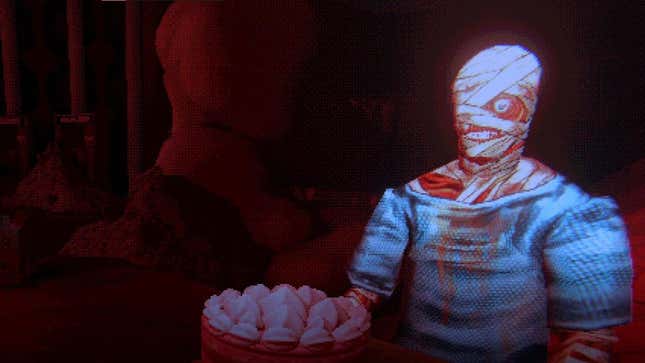
Image: Wrong Organ
For most of Mouthwashing, Curly is a haunting reminder of the consequences of his own actions. The game frames the captain of the Tulpar spaceship as the instigator of a crash landing that stranded him and his crew. His haunting burnt figure is mummified and he is left unable to speak, though he is kept alive and force-fed painkillers by his remaining crew as they try to survive the circumstances he ostensibly led them to.
While Mouthwashing adds a lot of nuance to Curly’s role in how everything went down, his design is one of the most striking of any video game character this year. His lone uncovered eye follows you through the room, you have to pry open his mouth to give him pills, and the visceral discomfort Mouthwashing creates every time you interact with him only grows as the psychological horror game goes off the rails in the second half. Mouthwashing turned out to be one of the breakout hits of 2024, and the image of Curly’s burnt figure has become one of the most iconic visual elements of any game this year. Despite its horrifying nature, Curly’s post-crash design has become a surprising cosplay trend online.
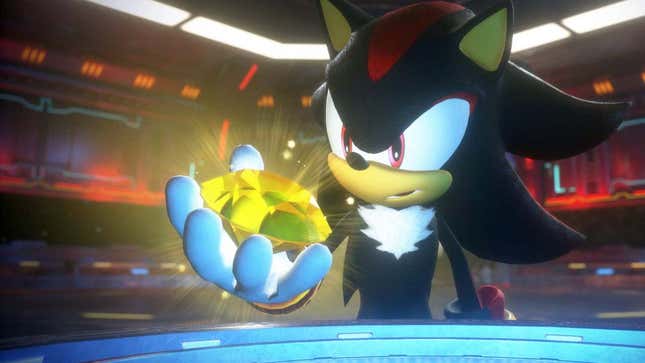
Screenshot: Sega / Kotaku
The Year of Shadow is nearly over, and Sega delivered on bringing Sonic’s angsty rival back into the spotlight. Sonic the Hedgehog 3 did an excellent job of utilizing Keanu Reeves’ soulful performance, and Shadow Generations felt like an apology for flattening one of the Sonic series’ most complex characters for nearly 20 years. The new campaign gives Shadow a chance to revisit the grief that weighed him down and the desire for companionship that helped redeem him, rather than treating them like bullet points on a character sheet Sega stopped looking at after Sonic ‘06. Given the success of Sonic the Hedgehog 3, Shadow will likely be spending more time in the spotlight in future games. It’s about damn time, Sega. The best character in the series is finally getting his due. — Kenneth Shepard
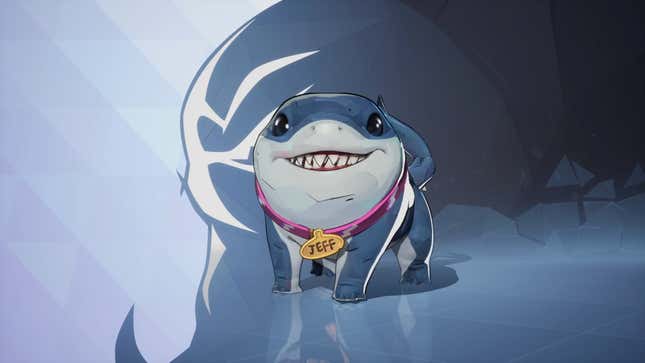
Image: Marvel
Rather than try to explain the majesty that is Jeff the Land Shark and his appearance in the hero shooter Marvel Rivals, I’m simply going to leave you with this video of the little freak singing the game’s theme song. — Kenneth Shepard
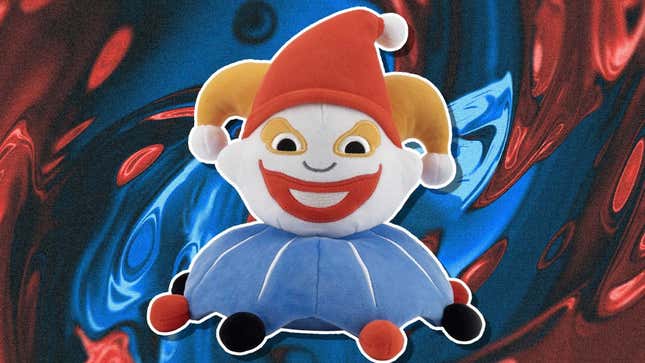
Image: LocalThunk / Kotaku
Jimbo from Balatro is basically a mascot for the Poker-based roguelike, but he’s also a remix of card game iconography who has become so iconic in his own right that he’s recognizable even if he doesn’t really do much with the source material. The talking Joker card has become synonymous with Balatro, and has even been turned into an official plushie. In fact, despite his humble, generic playing card origins, Jimbo has become one of the most recognizable faces in video games in 2024, and that was before Final Fantasy XVI actor Ben Starr played him in a trailer that one time. — Kenneth Shepard
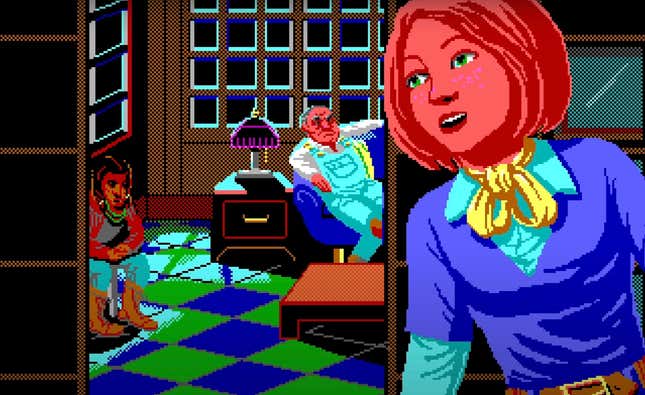
Screenshot: Julia Minamata / Kotaku
Nancy Maple is the plucky heroine at the heart of The Crimson Diamond, and her debut appearance is so great that I really hope we see more of her in the future. A clerk at Toronto’s Royal Canadian Museum in 1914, Nancy’s got big dreams and a big intellect, but society isn’t so supportive of her ambitions of studying geology at the university. Not one to be daunted, however, she seizes an opportunity to investigate the discovery of a massive diamond in the remote town of Crimson. Her can-do attitude serves her well, too, as she winds up getting much more than she bargained for when the diamond claim becomes a murder investigation.
Like a good Agatha Christie mystery, The Crimson Diamond features a colorful cast of memorable characters as suspects, and Nancy’s good-natured determination and practicality (she takes excellent notes!) make her the ideal person to hold down the center of this narrative whirlwind. It’s great to see the adventure genre get a bold new entry in the form of The Crimson Diamond, and to see the genre’s pantheon of female heroes—Rosella, Laura Bow, April Ryan, Kathy Rain, and others—welcome a terrific new member. — Carolyn Petit
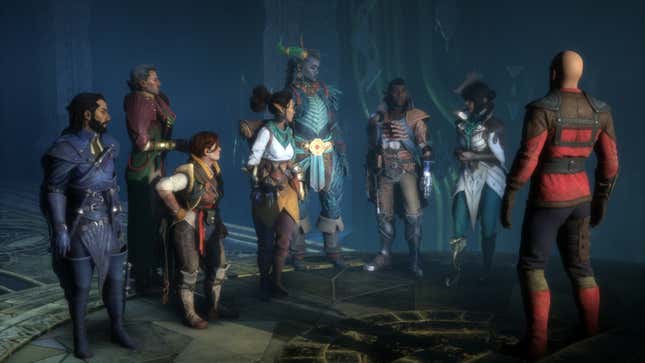
Screenshot: BioWare / Kotaku
Characters have always been BioWare’s bread and butter, but Dragon Age: The Veilguard has the strongest collective cast that the studio has ever put into its fantasy RPG series. There are no flops hanging out in the Lighthouse and scheming to stop the elven gods from taking over Thedas. Neve, the Tevinter detective, is a dutybound freedom fighter who still finds time to care about the little guy when the world is ending. The necromancer Emmrich spends hours waxing about the cultural significance of death but can’t just safely depersonalize it through study, instead needing to confront whether or not he’s actually at peace with what it means to manipulate death. Davrin, the elven Grey Warden, has spent so long assuming his life was forfeit that he has trouble conceptualizing a life for himself if he’s no longer doomed by the narrative.
Dragon Age: The Veilguard is full of small moments that encapsulate big ideas. Taash struggles with their gender, and it plays into the push and pull they feel between the culture they grew up in and the one they’re drawn to. Bellara is inextricably wrapped up in the history of her people, the Dalish Elves, and she uses that history as a reference for her own fiction which you can stumble upon her writing. Lucanis has a demon inside him that takes over his body when he sleeps, so he drinks more coffee than an overstimulated college student. Harding begins The Veilguard in a drab, unkempt room in the Lighthouse, but as she stays there, her caring nature shines through as it’s gradually grown over by a garden of her own making.
No, the members of the titular Veilguard don’t bicker or want to kill each other like the characters in previous Dragon Age games; instead, each of them is a beacon of light that shines all its own in a dark world that may grow darker if they don’t save it. Everyone wants to fight for a better Thedas, even as they each occupy disparate areas of BioWare’s fantasy world. — Kenneth Shepard

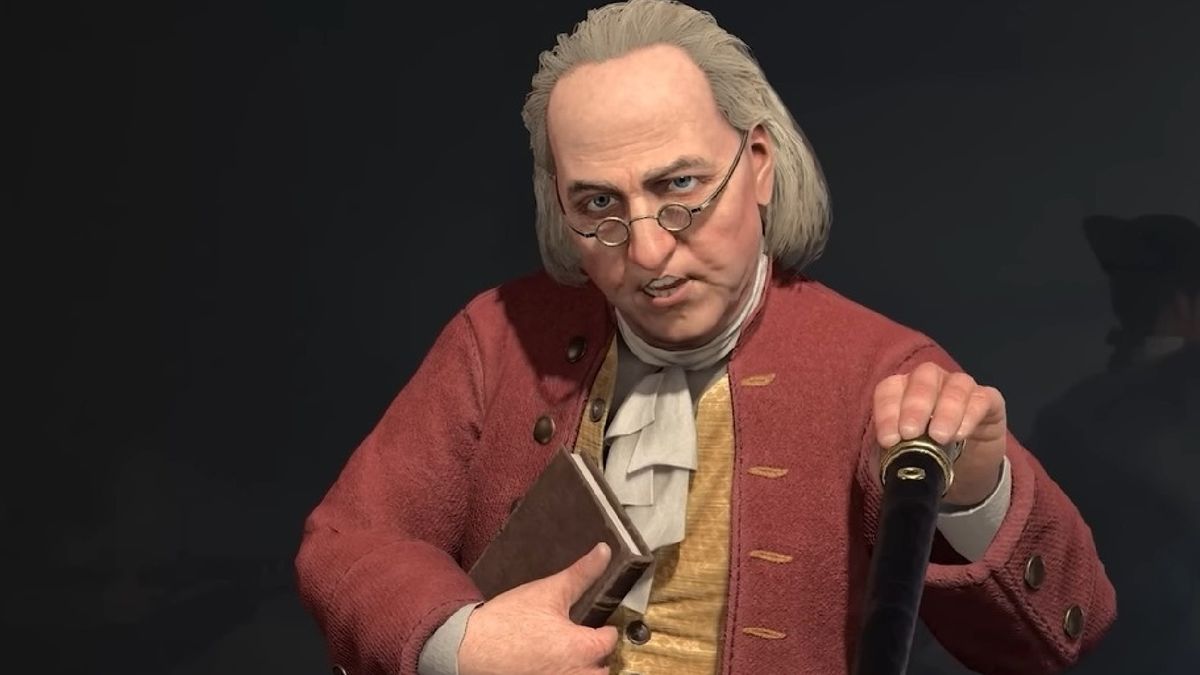

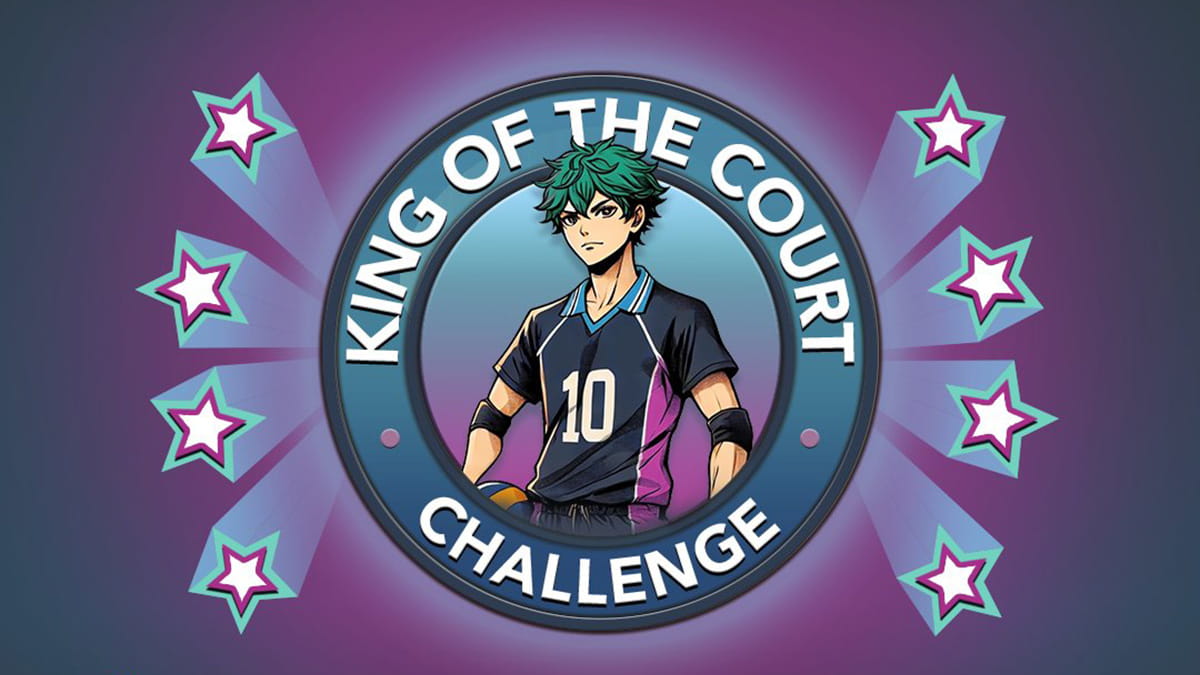





 English (US) ·
English (US) ·